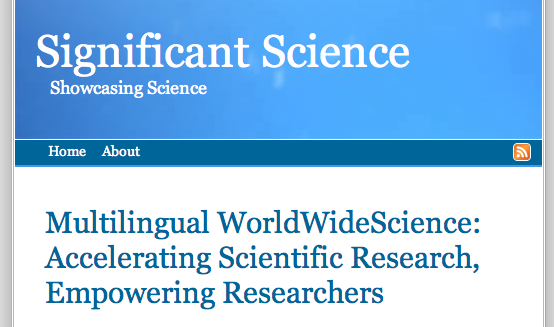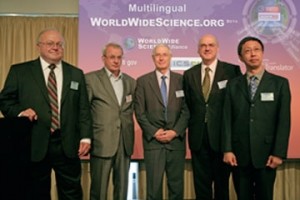
Hope Leman is one of my favorite people. I know of very few individuals who are as passionate about anything as is Hope.
Hope won second place in our second Federated Search Blog contest and I commented on her
passionate review of WorldWideScience.org in 2008.
Hope wrote again about WorldWideScience.org. Her article is at her blog, Signifcant Science. Hope is a research information technologist for a health network in Oregon. She is also Web administrator of the free online grants and scholarship listing service, ScanGrants, and of the free online search platform, ResearchRaven. From several conversations with Hope I know that ScanGrants is a labor of love and a good demonstration of Hope’s passion about helping researchers.
In Multilingual WorldWideScience: Accelerating Scientific Research, Empowering Researchers Hope reminds us of the key role that search plays in research especially in the world of free science and foreign language science.
Hope’s message is personal, and I love that:
As someone who grew up in a family that housed students who had left home and family in China, Japan, Iran, Korea and other countries to study engineering, chemistry, physics, biochemistry and so on at Oregon State University here in my hometown of Corvallis, Oregon I know what brilliant people there are in many countries who have so much to offer and what a boon it will be that the work of researchers worldwide will become useable to each of them and benefit the rest of us.
This update on Hope’s friend who suffered from ALS is even more touching:
I have recently lost a friend to amyotrophic lateral sclerosis and I would often sadly reflect as I bicycled home from her house about the glacial pace of progress on research on that disease and others like it. That is why I find Dr. Warnick’s enthusiasm and practical accomplishments so very admirable and the best possible case for paying one?s taxes with a minimal amount of grumbling. He is putting federal funds to exemplary use
Dr. Warnick, Director of OSTI, conceived WorldWideScience and his agency hosts and manages the search portal.
Databases and search engines aren’t about getting one’s job done. At the noblest level, they’re about solving important problems, and saving lives when we can.
[ Disclaimer: OSTI is one of my consulting clients. Deep Web Technologies, who built the single and multiple language search engines behind WorldWideScience.org and who sponsors this blog is another of my clients. ]






